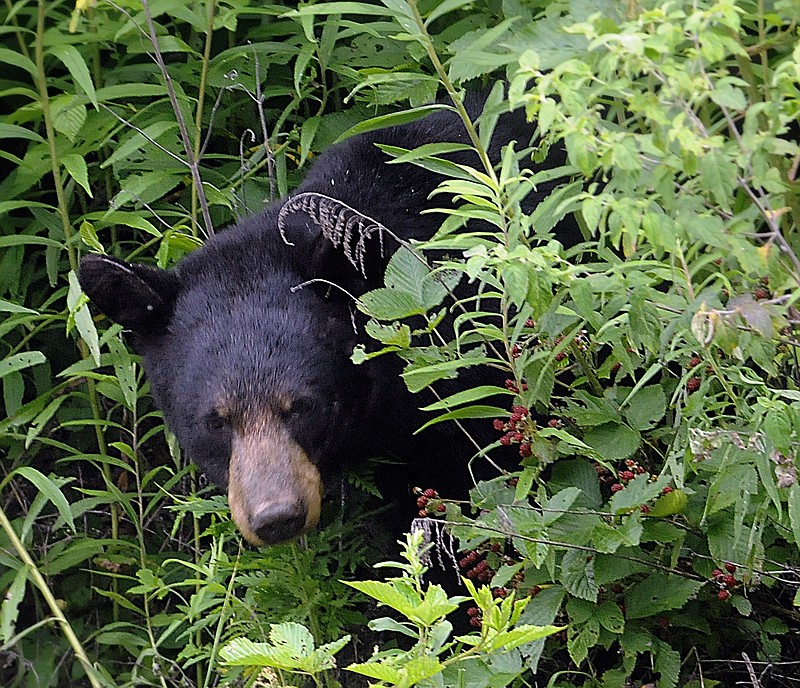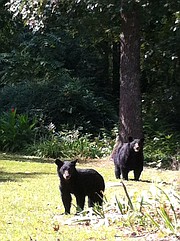More Info
DON’T FEED THE BEARS AND DON’T BE BEAR FOOD› If you see a bear in your yard, look large and make a lot of noise, back slowly away› Never approach or follow a bear to take photos› Do not purposefully feed bears› Remove all attractants from your yard including bird feeders, uneaten pet food and ripe fruits or garden vegetables› Store grills in a garage or outbuilding› Store trash and recycling in bear proof containers› Do not feed birds between April and January when bears are most active› Remove uneaten pet food from outside areas or feed pets indoors› Do not add greasy foods to your compost piles or compost in bear-proof containers› Keep cooking grills clean and stored indoors when not in useSource: Tennessee Wildlife Resources Agency
The Chattanooga region's largest predator, the black bear, is out and about this time of year and wildlife officials say it's important to avoid giving them handouts that could lead to a death sentence for the increasingly numerous beasts.
Wildlife officials in Tennessee, Alabama, Georgia and North Carolina say bear populations in recent years are rising. With the arrival of summer, officials say people should be especially careful because many of the bears they could see are hungry, inexperienced young males seeking territory and food.
Many people are familiar with the typical Appalachian postcard scene where people are stopped in cars along a winding mountain road with seemingly friendly black bears begging humans for handouts of food.
But that's exactly what people should not do.
And these sightings, and instances where people leave pet food outside or are actively feeding bears, are one of the leading reasons wildlife authorities are forced to euthanize bears.
The Tennessee Wildlife Resources Agency estimates the black bear population at around 4,000. While there have been no recorded attacks in the state this year, bear sightings on the Cumberland Plateau are becoming more frequent.
A sighting in Cookeville gained statewide attention recently because of the proximity of the bear to a large human population.
"We know it's going to happen," TWRA spokeswoman Mime Barnes said. "We just never know what city or town it's going to be in. They're out looking for new territory and don't know where they're going. They don't mean to come across humans."
More Info
BEAR FACTS› Black bears can be found across most of North America. Black bear habitat varies from the lowlands of Florida to mountains, deserts and subarctic tundra. Black bears can be found in and adjacent to metropolitan areas.› Colors: Black, brown, blond, rust, or cinnamon. Rare colors are white and blue› Size: Adults measure about 3 feet at the shoulder and 5 to 6 feet when standing› Weight: Adults weigh 125-425 pounds or more. Some Tennessee bears can weigh as much as 500 pounds› Life Span: Approximately 20 years› Eyesight: Similar to humans› Sense of Smell: Excellent; can span miles› Attributes: Very agile; climb trees well; good swimmers; and can run as fast as 35 mph› A black bear’s diet can include acorns, berries, insects, vegetation, fish and other live prey, and carrion. They mate during May and early June. They hibernate between November and April when food is scarce, though this may vary. Healthy mothers produce one to three cubs.Source: www.bebearaware.org
In North Georgia, black bears are most common in the eastern mountainous counties in the Blue Ridge Mountains, but they show up all over the state and their numbers are increasing. Georgia has an estimated population of about 2,200 black bears.
Black bears in Alabama, historically, occurred mostly in the southwest portion of the state around Mobile and appear to be a Florida subspecies of black bear, according to the Alabama Department of Conservation and Natural Resources.
But in recent years, black bears have steadily moved from Northwest Georgia into Northeast Alabama. These bears, the same ones that occur in Tennessee and Georgia, are a different subspecies known as the American Black Bear. The two varieties look very similar, officials said.
So how do bears wind up in backyards? TWRA officials say the issue is typically human related.
The smell of grease on a grill, ripe vegetables in a garden, trash and bird feeders not only attract bears looking for new territory, they provide effortless meals.
Once a bear gets an easy meal, it doesn't forget. The bears quickly become habituated to the convenience of human food and don't go back to their normal diet.
More Info
TIPS FOR HIKERS IN BEAR COUNTRY› Stay on established trails› Hike in groups during daylight hours only› Keep children close and in sight at all times› Make your presence known — call out› Bears may be more aggressive during droughts, storms and forest fires› Avoid carcasses. Report dead animals near a trail or campsite to a local wildlife officials› If an animal approaches, back away to maintain a safe distance› Taking pets on hiking trails is not advised — they may attract bears or cougarsSUDDEN CLOSE ENCOUNTERSDo not panic! Calmly group together and pick up small children. Do not run, make sudden movements or direct aggressive eye contact, which may instinctively cause the bear to chargeIf the black bear clacks its teeth, “woofs,” pants, growls or slaps its paws on the ground, it is warning you to back off. Give the bear a chance to identify you as a human, and not a threat. Let the bear calm down and retreat. Talk firmly in a low-pitched voice while backing away.A bear that continues to follow or circle you, disappears and reappears or enters your camp site during the day or night is possibly exhibiting predatory behavior. If the bear continues to approach or becomes threatening, your group should become increasingly aggressive by shouting, throwing rocks or using bear spray.BEAR ATTACKIf a black bear attacks you, fight back by hitting its nose and eyes with your fists, and by kicking. Your hiking companions can help you fight with walking sticks, pans, branches and rocks or their bear spray. Don’t play dead with black bears.Source: www.bebearaware.org
Bears do not naturally appear in trashcans or a person's backyard in the middle of town. Bears showing those behaviors have likely either been directly fed or have eaten improperly stored garbage or pet food, according to TWRA officials.
What is so wrong with feeding bears?
"We do have the adage 'a fed bear is a dead bear,'" Barnes said. "Bears habituated to human foods are the most dangerous bears on the landscape. They become so habituated that they will never turn back to eating normal food because they see what easy calories there are in our foods and how easily accessible they are. Most people say, 'why can't you just move it?'"
Well, finding a place to move a bear that is habituated isn't an easy task, Barnes said. There's also a lot to be taken into consideration, Putnam County wildlife officer Mike Beaty added.
"Relocating a conditioned, dangerous bear to another area just moves the dangerous bear, and this isn't an option," Beaty said. Bears will travel impressive distances to return to an area where they easily found food.
Officials also take several things into consideration when relocating, including females with cubs, the number of times a bear has caused an issue, the level of aggressiveness, the location and the nuisance concern itself. Cherokee National Forest and the National Park Service don't accept bears that have become habituated to a human diet because those bears become dangerous to the general population.
"We can't just move it to another part of Tennessee," Barnes said. "Then, it's a dangerous bear to someone else. It's pretty inhumane for the bear, too. They really have a hard time when they're moved."
TWRA Region 3 biologist Ben Layton added, "Euthanasia isn't our goal, and it's disconcerting when we reach this level. Our goal is helping people understand that human behavior most often causes nuisance bear issues."
Contact staff writer Ben Benton at bbenton@timesfreepress.com or 423-757-6569. Follow him on Twitter @BenBenton or at www.facebook.com/benbenton1.
Contact staff writer Mark Pace at mpace@timesfreepress.com or 423-757-6659. Follow him on Twitter @themarkpace and on Facebook @ChattanoogaOutdoors.

